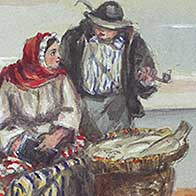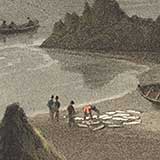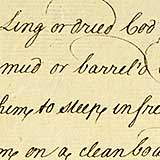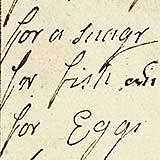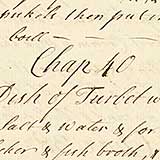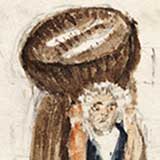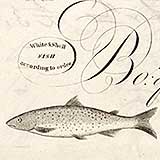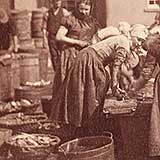
Fish and shellfish
Scotland is blessed with a plentiful natural larder.
With thousands of miles of coastline, Scotland has fish and shellfish in abundance. But archaeological evidence indicates early Scots ate little fish.
The fishing economy began in earnest when the Vikings arrived in the 8th century in search of herring and land to cultivate. Demand was fuelled when Roman Catholicism brought fast days to Scotland.
An integral part of the diet
Food from the sea, river and pond was plentiful and cheap, and by the Middle Ages was an integral part of most Scots' diet.
Later, entire coastal communities were set up devoted to catching, processing and packing fish for local consumption and export.
Fishing continues to be a major industry and employer in the 21st century, and Scottish salmon is a globally prized commodity.
[Off the Pentland Firth] '… the sea … was one third water and two third fish; the operation of taking them could hardly be call’d fishing, for they did little more than dip for them into the water and take them up.'
— Daniel Defoe, writing of a visit to Scotland in 1705 in 'Tour through the whole island of Great Britain'. [Library reference: NE.54.c.30]
Preserving surplus fish
Although plentiful, fish is highly perishable. Those relying on fish for protein had to find ways to preserve their surplus catches against hard times.
Preserving surplus fish
Dressing dried fish
Salted or air dried fish required lengthy steeping in fresh water before it could be cooked and eaten.
Dressing dried fish
Ochtertyre House accounts
Incoming provisions and daily menus from 1737-1739 for the Murrays of Ochtertyre are recorded in the Ochtertyre House Book of Accompts.
Ochtertyre House accounts
High-class cookery
In the 18th century, well-to-do families ate a range of fish and shellfish cooked on its own, in savoury sauces, in pies or mixed with meat.
High-class cookery
Fishwives
Mrs Foote-Gower from Ipswich was delighted to see fishwives in their distinctive costumes when she visited Edinburgh in 1854.
Fishwives
Cod and oysters
Edinburgh fishmonger Gillfillan Reid sold fish and shellfish to the wealthy from his shop and Fish Market stall.
Cod and oysters
Gutters at Stornoway
Salting and pickling fish, particularly salmon and herring, for export in barrels was an important source of income for Scots.
Gutters at Stornoway
'The 20th century cookery book'
Mrs Maclurcan's comprehensive 1901 cookery book contains 'a thousand practical recipes for everyday use'.
'The 20th century cookery book'
